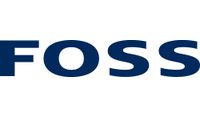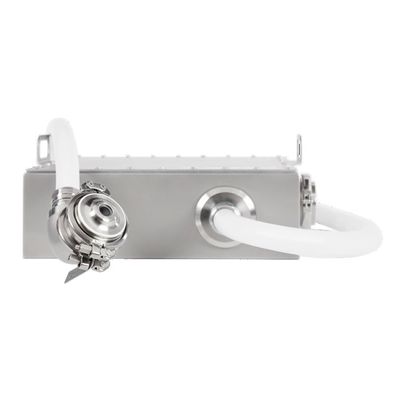


FOSS ProFoss 2 - Milk Standardization Analyser
ProFoss™ 2 provides direct and continuous measurements, helping you to optimize your milk standardization and make the best use of raw materials. Control variations of fat, protein and total solids to produce closer to target specifications. Confidently improve yield and profit while always meeting quality and legislative requirements.
Value
Run production closer to targets and improve yield and profit
Sample Type
Milk
Parameters
Fat, protein and total solids
Optimize your raw material usage
A common goal for milk standardization is to make the best use of raw materials and ensure that final products are as close to target specifications as possible in terms of fat, protein and total solids content. In this way, yield and profit can be improved with confidence while always meeting quality and legislative requirements.
In-line process control allows yet more value to be gained from NIR analytical technology. By measuring directly in the process every few seconds, process variation of key parameters such as fat, protein and total solids can be more closely monitored. Instead of controlling your process based on single laboratory results, you can control the production in real-time and significantly reduce the measurement uncertainty. This allows you to make real-time adjustments and bring final products closer to target.
True in-line results integrated in intelligent PID loops will reduce your variation significantly and enable you to move your targets closer to specifications.
As an example, at a daily production of 500.000 kg., reducing your average fat content by just 0,01% will save EUR 120.000 of butterfat per year.
FOSS can provide dedicated ROI calculations for cheese and powder, including protein savings, upon request.
Control your milk standardization using real-time analysis
ProFoss™ 2 provides real-time analysis results enabling you to react immediately on process changes and significantly reduce your process variations. Move fat, protein or total solids targets closer to product specifications and increase yield, profit and quality.
A high frequency of results ensures that nothing gets missed and that you will always have a precise picture of any fluctuations in the process. The ProFoss 2 lateral transmittance probe enables penetration deep into the product, allowing a larger product presentation to be measured. The latest generation of the lateral transmittance probe gives a significantly increased signal to noise ratio for higher speed and unique accuracy and stability.
At the same time, ready to use calibrations and the consistency of measurements ensures that multiple ProFoss 2 instruments can be relied on to always give the same high-quality measurements.
ProFoss™ 2 is based on near infrared technology and uses a lateral transmittance probe to analyse directly in the process pipe.
In dairy production, it is important for the infrared light to penetrate through a large product volume to obtain a good representative measurement. Light from the lateral transmittance probe penetrates deeper into the product than any other solution, making several scans during each measurement cycle. This ensures a highly representative result.
The ProFoss 2 probe is based on a sanitary design which meets international hygiene standards. The probe can be cleaned as part of the normal CIP procedures in the production plant.
The latest generation of the ProFoss 2 lateral transmittance probe has been developed to yield even more reliable analysis data. It has a higher intensity of light which offers a better signal-to-noise ratio and improved transferability, ensuring that all ProFoss 2 instruments can be relied on to always give high quality measurements. The frequency of measurements has also been boosted to give a clearer evaluation of variations in fat, protein and total solids, allowing for closer control against production targets.The latest technology behind ProFoss™ 2 ensures consistent performance day in, day out and year after year. Building on the reliable measurements delivered by each and every analyser unit, software and digital connectivity services help to maintain stable high performance across whole populations of instruments.
Calibrations can be monitored and adjusted remotely from anywhere. Automatic instrument monitoring and alerts can be set up and maintenance schedules can be proactively planned for optimal up-time.
Software and digital connectivity services contribute to reliable performance across individual or whole populations of instruments. ProFoss 2 units can be monitored and managed from a single desktop, for example, when making calibration adjustments or proactively planning maintenance cycles for optimal uptime. This can be done from anywhere in the world from any PC.
FOSS offers a complete service solution called SmartCare™ that ensures indisputable results from ProFoss™ 2.
Uptime is safe-guarded and trouble-shooting alleviated, setting you free to do your job in pursuit of improved yield and profit from your milk standardization. Partner with us to benefit from more than 30 years of experience of installing in-line solutions around the world.
Eliminate the risk of error with performance validationPerformance validation allows you to validate ProFoss™ 2 predictions using a FOSS benchtop analyser such as the MilkoScan™ FT3, without any manual entry of data.
Samples are measured and registered by the ProFoss 2 and benchtop analyser respectively to eliminate the risk of error and secure optimal performance. Using integration, connectivity and automation the results matched are saved via cloud and are ready for evaluation and reporting using digital services.
Measuring Technology: Lateral Transmittance
Analysis frequency: Real time: Average analysis time per result 2 - 3 seconds
Wavelength range: 850 - 1050 nm
Detector: Si Diode Array
Spectral dispersion Si Diode Array detector: 1.0 nm/pixel
Optical fiber protection:: Steel armoured (1, 3, 5 or 10 meters)
Process line interface: Sapphire, 5 mm thick, with food grade FFPM O-ring seal.
Fits into standard GEA Tuchenhagen Varinline Access Units with Ø68 mm opening or with Ø50 mm opening or FOSS Stainless steel welding
Product temperature
Max 150°C (302 °F)
Product pressure: Production pressure < 30 bar (< 435 PSI). Shock pressure < 75 bar (< 1088 PSI). Warning! Varinline access units higher than DN 80 permit a maximum pressure of 10 bar (145 PSI).
General
Technology: NIR technology
Software package: ISIscan™ NOVA for instrument control
Wavelength accuracy: <0.5 nm
Wavelength precision: < 0.02 nm
Wavelength temperature stability: < 0.01 nm/°C
Spectral Noise: < 60 micro AU
Vibrations - require optical fiber fixation
0.4 Grms
Ambient operating temperature:
Basic configuration -5 °C to 40 °C (23 °F to 104 °F)
Cooling with a compressed air line allows use up to 65 °C (149 °F)
ATEX configuration 0 °C to 50 °C (32 °F to 122 °F)
Pressurised air – cooling (Amb. Temp. 45 - 65°C): Cooling air Flow rate minimum 5 l/min, >99.9 % water free, >99.9 % free of oil and fine particles down to 0.3 μm
Ambient humidity
< 90% RH
Dimensions (W x D x H): w x h x d = 420 x 420 x 135 mm ( 16.5 x 16.5 x 5.3 inches) + brackets to hold the unit
Weight: 25 kg (20 kg)
Cabinet / Housing materials: 1.5 mm (lid 2.5mm) Stainless Steel EN 1.4301 (SS2333)
Mechanical environment
Process control equipment
Degree of protection: IP 69*
Approvals
ATEX & IECEx certified (dust explosion approved)
Hygiene: 3A hygiene certified
Communication: KEPServerEX (Ethernet, Analogue, Profibus/Profinet) to PLC/SCADA; FossManager™
Network: High quality, shielded LAN cable; minimum category 5e. RJ 45 (IP 67) LAN connections
Power supply: 1 phase, 100-240 VAC (max ±10 % of the rated voltage), max. 40 VA, 50 - 60 Hx
Operation
Indoor use or outdoor shielded from rain and direct sunlight
